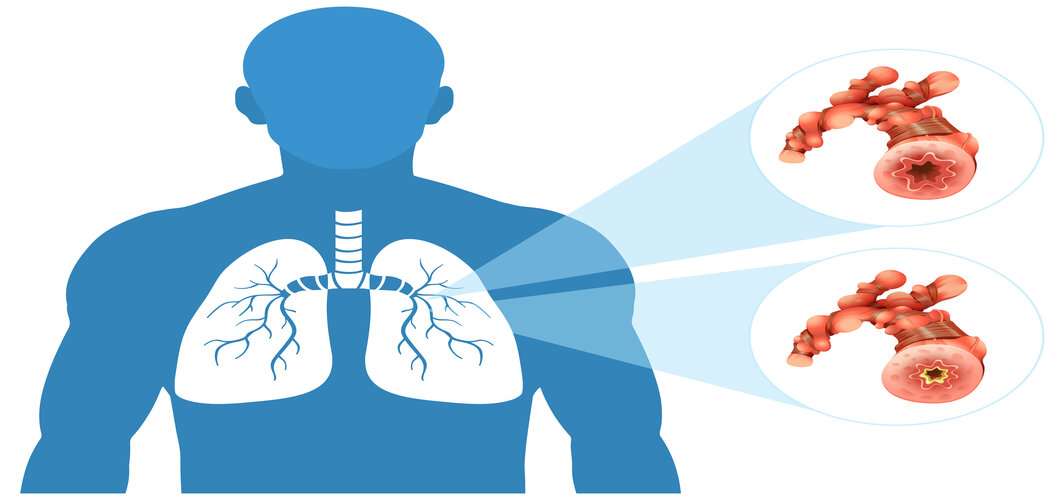Respiratory Health
How to Tackle That Niggling Chronic Cough
5 min read
By Apollo 24/7, Published on - 19 November 2020, Updated on - 10 January 2024
Share this article
0
0 like

Coughing can be annoying but it is an important defence action of the body. Coughing helps in expelling out the mucus, harmful microorganisms and foreign objects from the respiratory tract, which can otherwise result in infections and inflammation. The voice box (larynx) present in the human respiratory tract has nerves in it, which, on irritation, initiate the entire process of coughing. These nerves usually get irritated due to allergies, by body fluids (mucus and stomach acid) and on getting exposed to environmental factors such as dust, smoke, pollution or cold air.
Coughing is considered normal during seasonal transitions, as it could be due to an allergy. However, if the cough persists for long, it may indicate an underlying medical condition, that requires attention.
How is chronic cough different from other types of cough?
When a person coughs up for a minute or two, it is due to the response of the body to the food that may have entered the windpipe instead of the food pipe. If a person coughs for a day or two, it is mostly due to a cold or flu which clears away on its own within a week. When the cough persists for more than a week, it could indicate an allergy or bronchitis. However, if the cough does not clear up even after 3 to 8 weeks (sometimes months), it is diagnosed as chronic cough.
Unlike other acute illnesses, persistent coughing may interrupt sleep resulting in fatigue, reduced concentration power and lost productivity at work.
What can be the reason behind a persistent cough?
Chronic coughing is mostly seen in smokers, therefore it is also addressed as chronic smoker’s cough, in such patients. The toxic chemical contents in cigarettes irritate the respiratory passage resulting in a chronic cough.
However, non-smokers may also suffer from chronic coughs due to several reasons that include:
- Irritants in the environment: Toxic pollutants and irritants in the air can trigger coughing. Sometimes too dry or too cold air can also result in chronic cough.
- Postnasal drip: When the sinuses produce too much mucus, it settles down at the back of the throat, triggering cough more during the night.
- Gastroesophageal reflux disease (GERD): People with GERD may present with chronic cough without heartburn.
- Anti-hypertensive medication: Some people may experience persistent coughing after using ACE inhibitors, a medicine used to treat high blood pressure.
- Lung infections: Lung infection such as pneumonia may result in persistent cough. A person with an infectious persistent cough would also have a fever.
- Whooping cough (pertussis): Pertussis is a serious infection of the respiratory tract, usually seen in children.
- Asthma: People with asthma may present with persistent episodic cough without wheezing.
- Chronic bronchitis: People with chronic bronchitis have inflamed and narrow airways with excess mucus production resulting in persistent cough
- Heart failure: It has been observed that people with heart failure may present with chronic dry cough along with the production of thin frothy white sputum, fatigue and swelling in the legs.
How can one deal with chronic coughing?
A person with a persistent cough for more than 3 weeks must visit a doctor to get a proper examination done to find out the reason behind the cough. Meanwhile, certain things can be done to deal with chronic coughing.
- Smokers must quit smoking as it would only worsen the problem.
- Gargle with warm saline (salted water) as it helps in reducing the inflammation and itch in the throat.
- Avoid consuming alcohol, caffeine and other foods such as garlic, onions, tomatoes and citrus fruits, which may trigger the influx of acid in the patients with GERD, resulting in coughing.
- Consume small meals and do not lie down immediately after eating, wait for at least 2 hours.
- People may consider using over-the-counter available decongestants and medicated lozenges to reduce coughing.
- Use humidifiers, especially during the night, as it helps in adding moisture to the cold, dry air, thereby reducing the episodes of coughing.
Are there any natural ways to deal with chronic cough?
Various scientific researches confirm the effectiveness of certain herbs and natural ingredients in relieving chronic cough.
Ginger: A research was published in the journal Sage to determine the effects of certain herbs for the treatment of chronic cough, it showed that ginger was most effective in suppressing both dry and wet cough. Ginger also prevents the entry of respiratory syncytial virus in the throat, which can otherwise result in several respiratory tract infections.
Holy basil: A study published in a peer-reviewed journal Ayurvedic stated that the holy basil, popularly known as Tulsi, has the ability to clear out the phlegm and can help relieve cough experienced in allergic bronchitis, asthma and eosinophilic lung disease.
Liquorice: A research conducted to determine the effectiveness of liquorice, popularly known as Mulethi, showed that liquorice was able to reduce the symptoms of cough by 35% within 60 minutes. Liquorice has also shown effectiveness in reducing post-extubation (after removal of breathing tubes from the airway) cough.
Honey: Honey helps in soothing the throat, providing relief from coughing. It has also been established by various scientists that honey can provide immediate relief from cough.
Mint leaves: Menthol in mint leaves helps in numbing the nerve endings present in the throat, thus reducing the coughing, especially during the night.
When to visit a doctor?
In some cases, chronic cough can get severe and can present with serious symptoms that would require medical attention. These symptoms involve high and prolonged fever, excessive sputum production, blood in cough, pain in the chest, shortness of breath, wheezing, loss of appetite, weight loss, fatigue, urine leakage and night sweats.
Conclusion
In most cases, chronic cough is not serious and can be managed at home. However, if the cough is present with other symptoms, persists for too long or worsens with time, the person must consult their doctor as it can be an indication of an underlying medical condition.
For any questions relating to respiratory health, you can:
Respiratory Health
Consult Top Pulmonology Respiratory Medicine Specialists
View AllLeave Comment
Recommended for you

Respiratory Health
How Smoking Triggers Skin Health Problems
Studies show that tobacco smoke can increase various symptoms related to the aging process of the skin and induce its premature aging.

Respiratory Health
Obesity and Lung Function: Know How Your Weight Can Affect Your Respiratory Health
If you are obese, your risk of developing respiratory problems is higher. Here is what you need to know about the link between obesity and lung function.

Respiratory Health
What Are The Common Chronic Lung Diseases?
Chronic lung diseases are a group of disorders that affect the lungs and other parts of the respiratory system.
Subscribe
Sign up for our free Health Library Daily Newsletter
Get doctor-approved health tips, news, and more.
Visual Stories

Managing COPD During the COVID-19 Pandemic
Tap to continue exploring
Recommended for you

Respiratory Health
How Smoking Triggers Skin Health Problems
Studies show that tobacco smoke can increase various symptoms related to the aging process of the skin and induce its premature aging.

Respiratory Health
Obesity and Lung Function: Know How Your Weight Can Affect Your Respiratory Health
If you are obese, your risk of developing respiratory problems is higher. Here is what you need to know about the link between obesity and lung function.

Respiratory Health
What Are The Common Chronic Lung Diseases?
Chronic lung diseases are a group of disorders that affect the lungs and other parts of the respiratory system.



